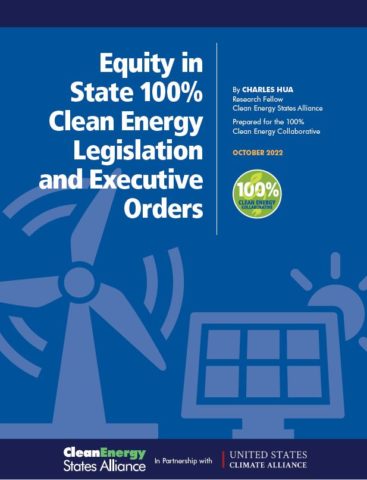Equity in State 100% Clean Energy Legislation and Executive Orders
Charles Hua | Clean Energy States Alliance
This report identifies, collects, and summarizes all the equity-related provisions that have been included in the legislation and executive orders that have established 100% clean energy goals in 20 states and the District of Columbia. The report can serve as a useful resource for state officials and a wide range of other stakeholders who may be interested in knowing how equity and environmental justice have been addressed in the legislation and executive orders.
In the years since 2015 when Hawaii became the first state to establish a goal of 100% clean electricity, there has been strong momentum for states to establish goals, targets, and timelines for achieving 100% clean energy—either for the electricity sector or the entire economy. A majority of Americans now lives in areas that have established a 100% clean energy goal.
This trend has coincided with growing societal concern about equity and environmental justice. The federal government’s Justice40 Initiative plus many provisions in the Inflation Reduction Act (IRA) parallel state efforts to address equity and environmental justice, including in their 100% clean energy legislation or executive orders.
The new CESA report is based on a review of all the 100% state clean energy legislation and executive orders. The report outlines different state definitions of equity and environmental justice, proposed mitigation solutions, and planning and implementation processes. It does not assess the quality or effectiveness of any particular policy.
By condensing information from many states in one place, the report can help stakeholders understand what has been done so far and what could be done in future policy development.
This report was produced for the 100% Clean Energy Collaborative, an initiative that CESA created to assist states that have deep decarbonization goals. The Collaborative provides knowledge-sharing activities and analysis so that states can address program challenges and opportunities. The primary participants in the Collaborative are state agency officials with responsibilities for achieving their state’s zero-carbon goals, as well as policymakers in other states who may consider establishing similar goals.
Associated Project(s):
Resource Details:
Date: October 19, 2022
Type: Report
Topic(s): 100% Clean Energy, Low- and Moderate-Income Clean Energy

